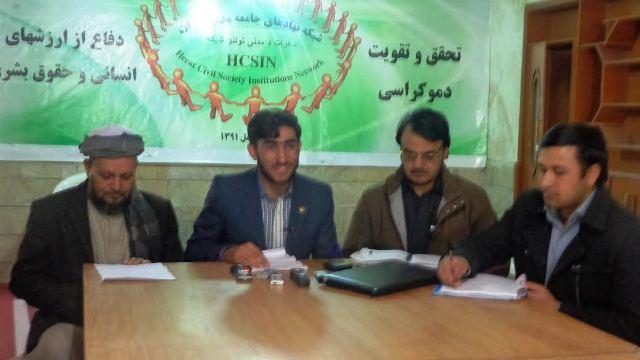FEROZKOH (Pajhwok): Some residents and civil society province say people have lost confidence in judicial organs due to inordinate delays and flaws in dispensation of justice.
As a result, most people contact local commanders and militant groups for the resolution of their disputes. They complain of growing corruption in the justice sector.
Officials confirmed over 4,500 illegal armed men belonging to 100 different groups were waging a struggle against the government in Ghor. Their activities have undermined people’s trust in the government.
Dwellers of several localities said corruption and mismanagement in judicial institutions had forced them to approach insurgent commanders for resolving their disputes in a swift manner.
They blasted the authorities for miserably failing to eliminate corruption. The need for seeking justice form armed commander would have never been felt if the government had eliminated graft and provided the masses with speedy justice, residents remarked.
Ghulam Mohammad, hailing from Pasaband district, said: “I gave 200,000 afghanis in bribes in different courts and waited for three years for the resolution of a dispute over five acres of land. But my efforts yielded no result and the land dispute has not been resolved so far.”
Disappointed with the government, Mohammad took his case to local Taliban decision.
A resident of the Kamanj are of Shahrak district said his brother was killed by an unidentified gunman, but the judicial authorities refused to arrest the killer. “I contacted Mullah Mustafa, a local commander, and he nabbed the killer in one week…”
Back in 2008, NATO claimed killing Mullah Mustafa in an airstrike, but the alliance later retracted its assertion. At least 16 people, including Mustafa’s brother and a son were killed in the raid.
Meanwhile, some residents said government departments — specially the judicial institutions — were highly corrupt. They claimed no case moved ahead without bribes being paid to court officials.
Mohammad Sadiq from Pasaband district waited for three weeks to receive compensation for the killing of his son, who served as a police official. He said it was not possible to get his right without paying bribes.
Habibullah, another resident, said the resolution of cases was not possible without money or a strong reference. A majority of innocent people remain behind bars because they do not have money or recommendations.
An individual, who wished anonymity, said that corruption had literally become legalised in judicial organs of Ghor. He secured the release of his brother from police custody in return for 100,000 afghanis. “My brother had been arrested on robbery charges.”
But the appeal court chief, Gul Ahmad Haidari, denied rampant corruption in government departments and said the level of graft had declined. He said his office was trying to eliminate the scourge.
He argued it was the responsibility of intelligence personnel to detect corruption cases and refer them to the attorney general’s office. Haidari promised corruption cases would be investigated after the new cabinet was announced.
Civil society organisations head, Khudayar Waqif, linked increased corruption to the government’s carelessness in investigating such cases and punishing the perpetrators.
He stressed corruption would persist as long as a new reform system was not created. “Graft is not confined to bribe; recruitment of non-professional individuals, land grab and misuse of authority are major forms of corruption.”
“One instance is that when an individual with a weak financial background is appointed to a high position and he becomes rich overnight or buys a car and a house while other people live in poverty,” he explained.
The human rights commission also said the existence of illegal commanders were a major obstacles to the government, as they created a parallel system in their respective areas.
Jawad Rezayee, the commission head, said illegal commanders never allowed a problem to be resolved by the government; they addressed such issues through their illegal courts. He asked the government to disarm the armed men.
Acting Governor Syed Anwar Rahmati, who confirmed the existence of illegal armed men, promised stern action against such groups. All irresponsible armed individuals would be disarmed, he pledged.
He continued the problems local people faced in resolving their issues would be addressed by the government. The number of security forces in the province was not enough to deal with the challenges, he complained.
Rahmati also confirmed corruption in government offices, but said changes in the relevant had helped contain the problem in recent years.
An anti-corruption committee has been set up by civil society, media outlets, provincial council and the attorney general’s office. Its head Abdul Qayum Shadab said corruption was a dangerous phenomenon.
“If corruption is fuelled by government officials, one aspect is the people who pay bribe,” he said, calling for government-public cooperation in weeding out the problem. He added the committee would help promote public awareness.
nh/mds/mud
Visits: 3









GET IN TOUCH
NEWSLETTER
SUGGEST A STORY
PAJHWOK MOBILE APP